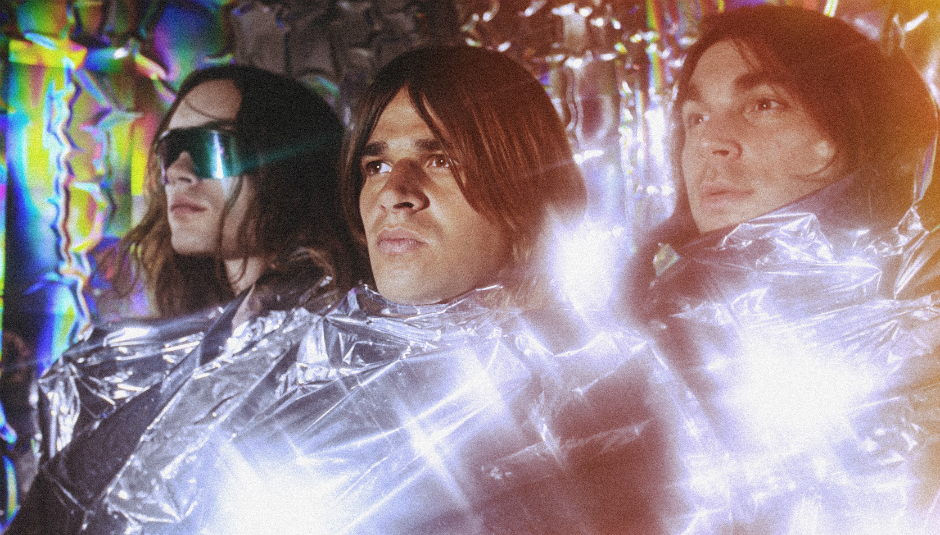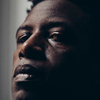Three men united by a deep love for the classic 60s sound, psychedelia, British pop, a sense of optimism and positivity, that’s Ukrainian band Love'n'Joy - Anton Pushkar, Andrii (Andrew) Sukhariev, and Sergey (Serge) Zlobin. Tapping into what they perceive to be the journey of "tribal collective unconsciousness" soundtracked by the retro genre, the group - who are based in Kiev - have been performing together since 2015, and have recently started to spread their wings outside the eastern European nation to tour in Switzerland, France, Poland, Germany, and further afield.
Originally formed in 2008, Love’n’Joy went through a transformation when its first incarnation disbanded, leaving just Anton to carry on the name, teaming up with Andrew and Serge in 2015. Since their first release, a self-titled EP, they’ve eased into their sound, embracing the heyday of the 60s and 70s but with a 21st Century sheen. The band perform most of their songs in English, with seemingly effortless songwriting defining their dreamy cuts, imbuing their productions with strong indie influences and even a spot of electronica. You’ll also hear the odd song recorded in their native Ukrainian, like early recording ‘Ananas (Живемо лише раз)’, for example.
Coming together in a climate of extreme tension due to conflict with Russia, Love’n’Joy find solace in their music endeavours, expressing some of the stress and aggression that can arise from living in difficult circumstances. They have also had to contend with a relatively regressive music industry that is only now starting to flourish and offer space to more alternative acts.
We sat down with the band to discuss their history, life in Ukraine and the country’s growing music industry.
DiS: Let’s start at the beginning - tell us about your individual musical histories? Who were some of your early idols? And how did you get started with playing an instrument?
Anton Pushkar: When I was four years old, I remember being woken up rather abruptly by the sound of Brian May's guitar solo. My father was a big fan of Queen, Pink Floyd and some other 70s rock-n-roll bands. He had lots of cassettes, some vinyl and some videotapes, which were really rare in our city at that time. Between the ages of nine and 12 I started to hang out with my cousin and his punk-rocker friends, who were all about ten years older than me. They spent a lot of time trying to teach me how to be the real rocker, introducing me to lots of heavy music, but the only band that really stuck with me was Nirvana. Later on, I got hooked on 90s Britpop. At college, it was seriously boring until I bought my first guitar. With a guitar in my hands, I started revisiting all the legendary records of the golden age of rock music, especially late 60s psychedelic music and hard rock.
Andrii Sukhariev: It’s all because of my family. Most of them like to sing and play instruments. My grandma was a singer in a local national choir for a long time. Just the mere thought of being a guitarist affected my brain so much in childhood, I was fixated. Since that time I’ve spent a lot of time learning about music, listening and discovering new things about my own tastes. Year after year I absorb so much new information and have this unstoppable feeling inside, it’s become a kind of addiction for me right now.
Sergey Zlobin: I have to thank my father. I began to explore music by delving into his small CD collection. You could find performers like The Beatles, Queen, Louis Armstrong, Eric Clapton and others on his shelf full of music... but at that time I liked Michael Jackson the most. I started playing the drums right after graduation. With Anton and his brother Denis, we had the idea of creating a band, but none of us could really play instruments. Later in Kiev, I found a teacher who taught me the roots of basic drumming. Because of this, I fell head over heels in love with this instrument.
Tell us about your connection with psychedelic rock? Why does this particular genre resonate with you?
SZ: It's hard to explain it in words, it needs to be felt.
AP: It seems to me that psychedelic music digs into some of the deeper levels of our existence - abstract and meaningful at the same time. It can facilitate a journey through the psyche of oneself to the tribal collective unconsciousness. Who knows what it could be, but it's definitely not just a source of aural pleasure, although we like to explore that aspect as well, with our music of course.
AS: My strong spiritual connection with this genre started with Pink Floyd and the huge array of bands from that period. I believe that analogue music production retains a lot more unexplainable magic in the process. I just like it.
How did you record your first song??
SZ: Most of our new records were conceived and recorded at the Crimy Rec studio, that we all helped to build with our own hands. As a strict rule, we record each instrument separately. This is a painstaking process, but the result always justifies our expectations.
AP: Although I must add that we recorded our very first song in a TV studio. It was quite an experimental process. Our friend was working there as the sound engineer, and we were allowed to use some equipment there overnight when it was off-air. It was not a Hi-Fi recording, but it was the start of something bigger.
What was it like growing up in Ukraine? Was there much local music that inspired you? If so, who were the Ukrainian artists you enjoyed listening to?
AP: Growing up in Ukraine was a pleasure for us, mainly because Yalta is in the south, on the coast of the Black Sea surrounded by Crimean mountains. Nature, clean air, everything was perfect for growing up. Of course, there was the other side of it. The dissolution of the Soviet Union was not so easy for our parents and our health in general. It was, and still is, a period of transformation. Today Ukraine still struggles to get full independence, nowadays it’s even worse - we are having a war with Russia and Crimea (our homeland) is occupied.
Talking about music in Crimea, I can't remember anything influential from the local scene. It's more of a resort city where you can find restaurants and music that suits this ‘holiday’ environment. But Yalta is a port city as well, and lots of cruise liners were docking there, bringing new energy into the city all the time. That was really beneficial for cultural exchange, and for people who were seeking for the music from the West. One of the great things about this is that you can find some tremendous vinyl collections hidden in your friend's parents' attics...
SZ: I can’t say that there is a lot of music that inspires me in Ukraine. But there was a time when everyone was listening to the Okean Elzy band. I also like the Scriabin band. Their songs have funny lyrics and they have a charismatic frontman. Unfortunately, he died in a car crash three years ago.
AS: Our nation loves partying, the red-hot blood of the Cossacks still runs through our veins. There was and still is a lot of local music that inspires me: As Serge said, Okean Elzy is a legendary band, and Vopli Vidoplyasova - they’re a very famous band. I like early Katya Chily and the most popular worldwide (and perhaps nationally) are Dakhabrakha. I just started exploring the 60s and 70s Ukrainian music scene and found a lot of brilliant jazz-funk bands like Arnika, Nazarii Yaremchuk, Kobza, VIA Vodogray. If you know nothing about Ukrainian old school music - you can check it on YouTube by searching - C.J.PLUS - Ukrainian funk. I love it.
Can you tell us a little bit about the Ukrainian music scene right now? Is there much room for younger, more ‘alternative’ acts to break through?
AP: Ukrainians are very creative people in general, in the arts and so on, just as much as they are in the musical field. Lots of new acts are emerging constantly, but most of them disappear quite quickly and never seem to come back. The main reason for this is that our music market is not developed at all, I think it's only just starting to get up to the standards of the rest of the western world right now. Especially in comparison to the UK and US markets. But there are lots of promising developments; for instance, new festivals appear each year, Ukrainian bands are traveling around the globe, and it’s looking really positive for more alternative acts particularly. And I think it’s partly our mission too, to build bridges and connect with the world outside of Ukraine, for future generations of musicians here to benefit.
AS: I think sometimes there are too many similarities with modern western projects though, a slight lack of originality shall we say. But our friends Atomic Simao are the perfect alternative to everything that is going to the top of the Ukrainian charts. And not only them, a few others, too. Recently we started doing shows with them, that showed me the power of the new underground society in Ukraine.
How has living in Kiev itself influenced your sound?
AS: It teaches you to find yourself in a mess!
AP: Living in Kiev has had a tremendous influence on my desire to make music. Compared to my hometown, Kiev is a quite a rough city, it's super cold in the winter time and outdoor activities seem almost impossible. So when you want to stay inside as long as possible, the rehearsal space becomes a paradise where you can let your imagination flow, practice with your instruments, and truly develop your sound. All of this would be impossible in Crimea, where you want to be outside all the time, experiencing the world with all your senses rather than your imagination.
Also, here in Kiev lots of events are happening, good and bad. These influence your attitude a lot. We went through two revolutions, this was a really tough time in our history, especially the second one, in which some of our relatives and acquaintances died or were injured. But it's a long story that still has no end. All of this affects us and our music too.
So tell us about the current climate in Kiev?
AP: It's getting better, I guess. More opportunities are opening up for musicians, more new clubs and venues to perform. Some brand new independent radio stations have popped up, too. I think it's a good sign.
AS: Every possible vibe is here! I can’t say that every person is a punk or a disco dancer. I would say that there is a renaissance of music in Ukraine right now, it’s exciting
SZ: It’s great - as the guys say, Kiev is actively developing in musical terms. A lot of famous artists come here regularly now, which inspires a lot of people to learn how to play and perform. A huge number of music festivals are happening and there’s a wide variety of music events happening all over town, for every taste.
Anton, you mentioned the political situation in Ukraine, how much does this influence your music?
AP: It stirs up mostly negative emotions. Sometimes it inspires me to write an angry, aggressive song. The things is, even when you try not to reflect on these issues, it's hard to avoid them.
AS: Yeah, the whole situation creates feelings of disappointment and a little bit of madness.
SZ: It’s difficult, the political situation in Ukraine is quite tense. Whether you like it or not, it affects you in daily life and is subconsciously reflects in your creativity, especially in terms of aggression.
Are there any other young bands who, in your opinion, are doing exciting things/making cool music in Ukraine?
AP: I’d say Meleron, Omadada, Our Atlantic and Nights Out.
AS: I would recommend a band called - [o]. They are very professional musicians and use Ukrainian lyrics. Also Make Like A Tree is an insane guy with a beard, travelling the world and making music by himself. Stoned Jesus are very highly motivated guys that became famous recently.
SZ: I would add also Somali Yacht Club, Jinjer, and Tympache.
How would you describe the Love'n'Joy sound?
SZ: Melodic, loud and groovy.
AP: Yeah, tight, groovy and dreamy at the same time.
AS: It’s like a Boeing 747 flying through stormy clouds with a party going on inside.
Does your music carry a message? If so, what?
AP: The name of the band carries the main message. Everything else is a bunch of subjective feelings, emotions, and observations. Reflections of the surrounding reality. There is no direct message for anyone. How you see this world is your own personal perspective.
SZ: Yes, the main message is LOVE and JOY to all!
For more information about Love'n'Joy, please visit their official website.






















